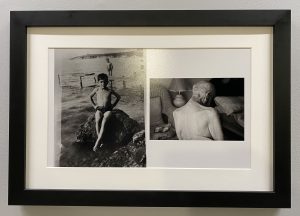Poems
Alzheimer’s Abecedarian
If it comes as an acrobat, you’ll somersault on its teeterboard, trampoline off its walls.
If it comes as a bird, sit with it, its broken wings.
If it comes as a canteen, it will rattle empty, empty, empty.
If it comes as a dog, wag its tail and pat its head, use a soothing voice; try not to yell.
If it comes as an elephant, it will be the only elephant in the room.
If it comes as a faultline, tiptoe around it on eggshells.
If it comes greedily, it will take everything, leave you a pauper.
If it comes as a horse, turn its neck gently with the reins to lead it back to the barn.
If it comes as ice, remember that ice can burn even as it melts.
If it comes as a junkie, keep it from cracking its head on thunder.
If it comes as a kangaroo, you’ll go everywhere in its pocket, you’ll be its joey.
If it comes as laughter, it will have the last laugh.
If it comes as a mother, it will be a motherfucker.
If it comes as a nudist, you will see its bones.
If it comes as an overdose, it will overcome you with overtakelessness, that which
cannot be overtaken.
If it comes as a prairie, it will take miles to cross; look for sweetgrass
to nibble along the way.
If it comes quietly, creeping in like lichen coating your branches,
it will grow so softly you won’t hear it for years.
If it comes as a rifle, it will shoot bee as silently as raindrops
fall on a lake and disappear, becoming part of the lake, inseparable
from what makes a lake a lake.
If it comes as a stadium, you’ll fill it with tears.
If it comes as a tiger, you are its prey—years of you to gnaw away,
licking your skin, inhaling your scent, slowly sharpening its claws.
It will come unannounced, unbridled, uncircumcised, undeniably
unearned, unforgivingly, ungraciously unhindered; uninvited, unjustly,
unkindly, and unlovingly; unmapped, unnervingly, unobtrusively-at-first,
unpacified, unquenchably unraveling; unsigned, untiringly, unurged,
unvaccinated and unwashed: un-X-rayed, unyieldingly unzipped
under everything.
It will come as vapor, at first as only mist mingling so lightly
with days of bright sun, you’ll barely notice.
It will come as waves—you’ll bob in its current for years, drifting
into deeper water until you too are treading just to stay afloat,
riptide trying to drag you both out. No, it comes as wind, stripping
the notes from the score, the steps from the dance, the seed
from the shell, the glue from the seal, the north from the south,
the bees from the hive, the sheets from the bed, the pink from the dawn,
the east from the west, the west from all the rest.
It comes as a Xerox copy with its own irreplaceable toner running out,
the copies getting fainter and fainter, ghostly impressions
on a nearly blank page.
It comes as yeast, rising and rising, filling the whole bowl.
It comes as a zigzag and you will breathlessly chase its shadow
across the grass, you will chase the shadow of the shadow,
the zags of the zigs and the zigs of the zags.
Harvest of What Remains
Many apples ago, I climbed a crabapple tree, scrambled to pick
the round, bitter fruit. Bitter but beautiful, that hard lesson I taught
myself to keep my desire from consuming itself, like those overripe
drops that fall in the orchard, thick with bruise and blight, spreading
like split hems beneath the trees. From the harvest of what remains—
ginger golds, ambers, russets, crimsons—see how they make
a welcome mat of their dying. Then stand at the door to find out
if you will be let in or locked out, if this is to be your last supper
or splendor’s summit, your squander, your reprieve, or the pulp
of sorrow. Pick yourself up from wherever you have fallen
to the ground, look around for a branch to land on, an unlatched
screen door that might open. And what will you do then with all
the light you’ve consumed, spellbound with mouthfuls of wonder,
when love tumbles its frantic windfall into your arms?
letters to the beloved written on egg shells
The beautiful letter drawings in my book were created by my art partner, Connie Saems. In addition to our book collaboration on *Harvest of What Remains, *since 2023 we have been pairing poets with visual artists to have them respond to one another’s work. Seven pairs exhibited at Gallery Twist in Lexington, MA, in May 2024. Here’s the poem I wrote in response to Connie’s eggshells. Thirteen pairs of artists and poets will be exhibiting together with Connie and me at Gallery FiveSparks in June 2026. Visit conniesaems.com to see the full range of Connie’s work.
Grief has written letter after letter
to her beloved, has torn them into strips,
has seamed the broken
words and phrases into and over
hundreds of broken eggshells
from months of morning breakfasts,
covering the brokenness
with the broken
to make a residue
of loss as unreadable
and unquenchable as Grief.
I peer into a shell, strain to read —
OFTLY ESTERDAY NORNUMB—
runes printed in tall thin
block letters, ghost words that ripple
through conjecture and regret,
the cracks between the whys and what ifs.
Grief has tossed for months on shards
of wave-loss until the shells have become bowls
from which Grief drinks
from the no waters, sips
the sea change of bone-dry fragments—
I DON’T SE LETITGO AVEN’T—
Grief has made a way-road,
sacred carvings
along a shoreline
where Grief might find
a place to rest among stones and sand.
In the leaving and leavings, I search hard
through the snipped print,
grieving my own
beloved’s WID NING FIS SURES,
his slow DIS-
AP PEAR ING
—from the exhibit “Not Know” by Connie Saems
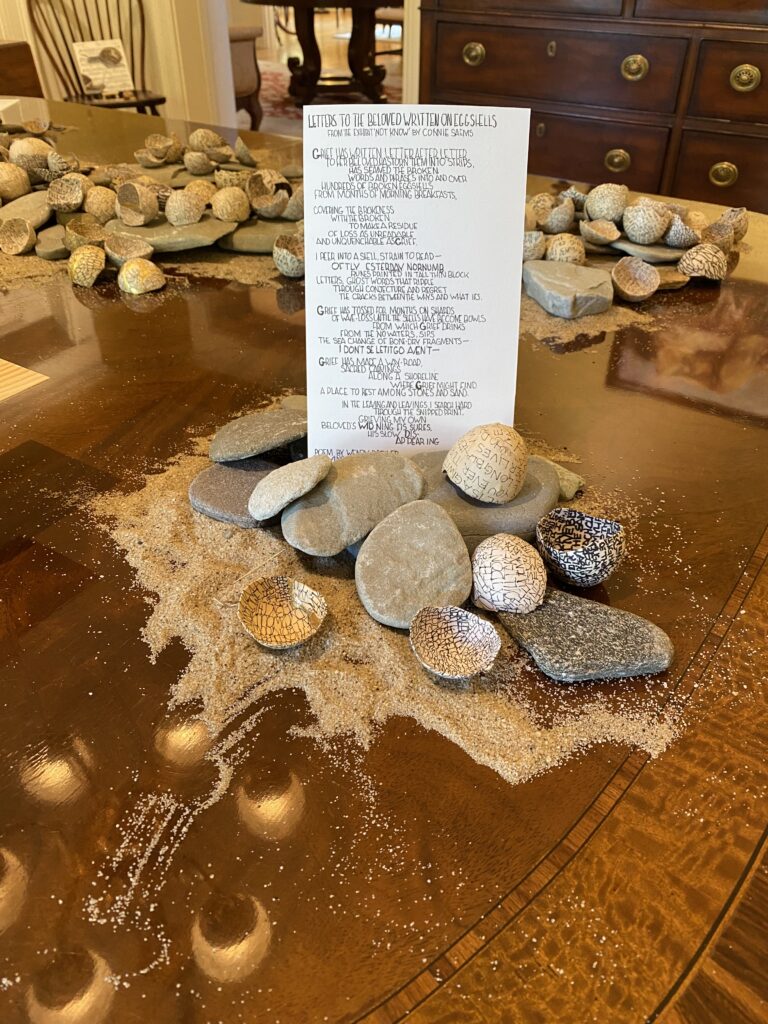
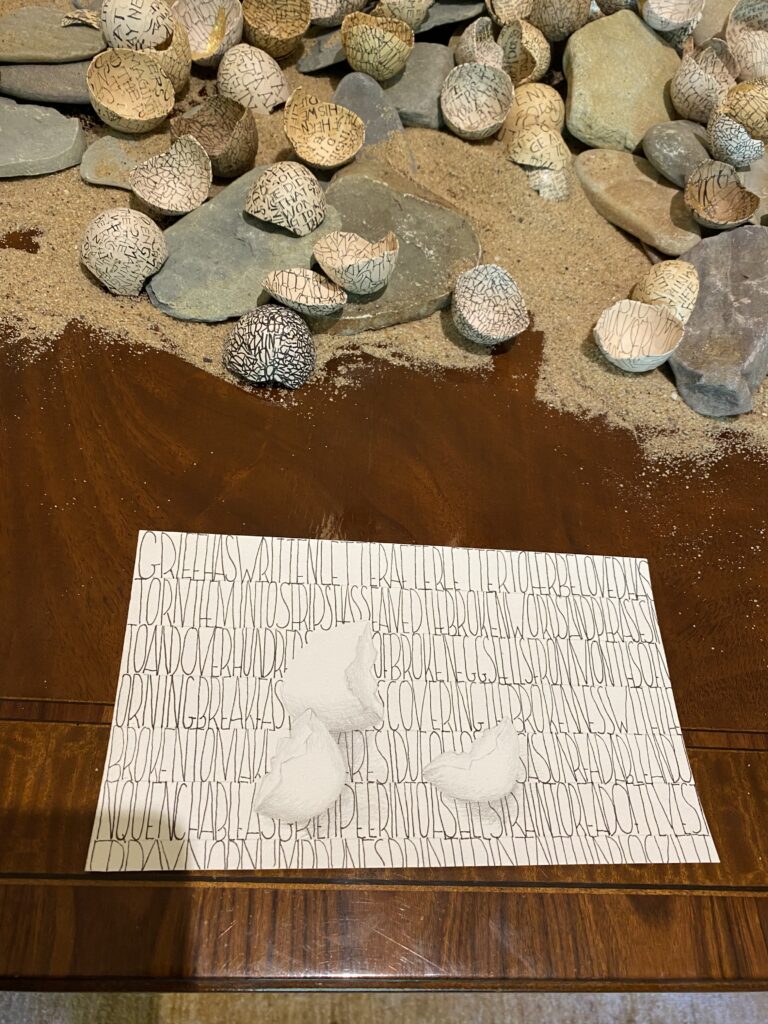 .
. 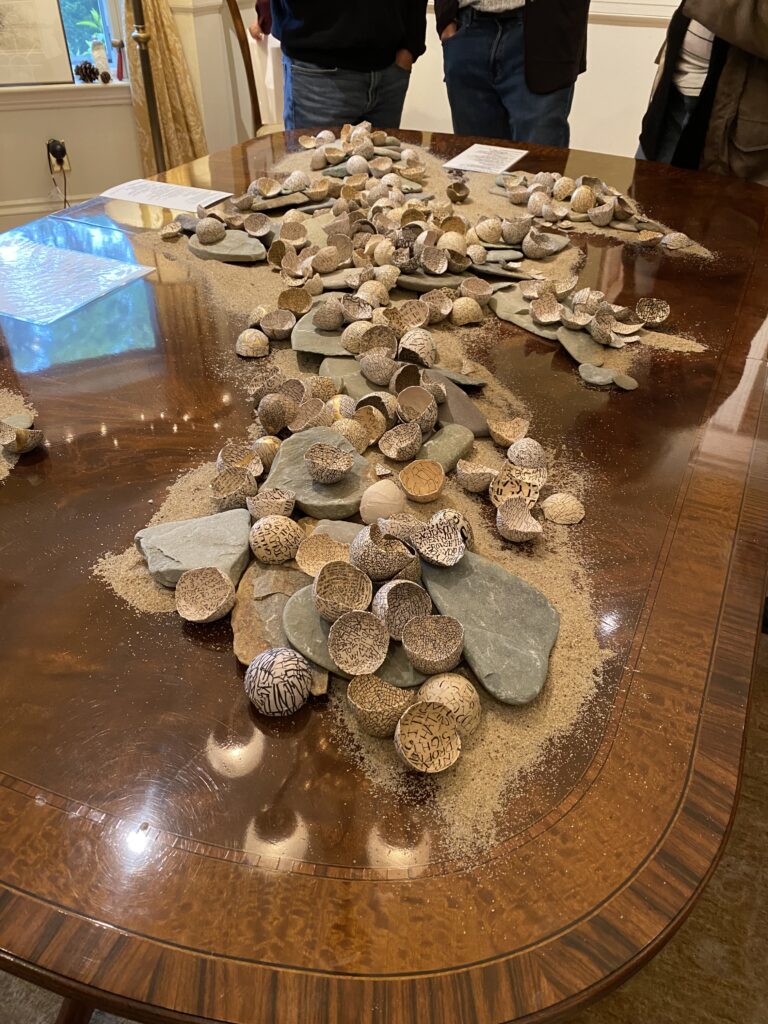 .
. 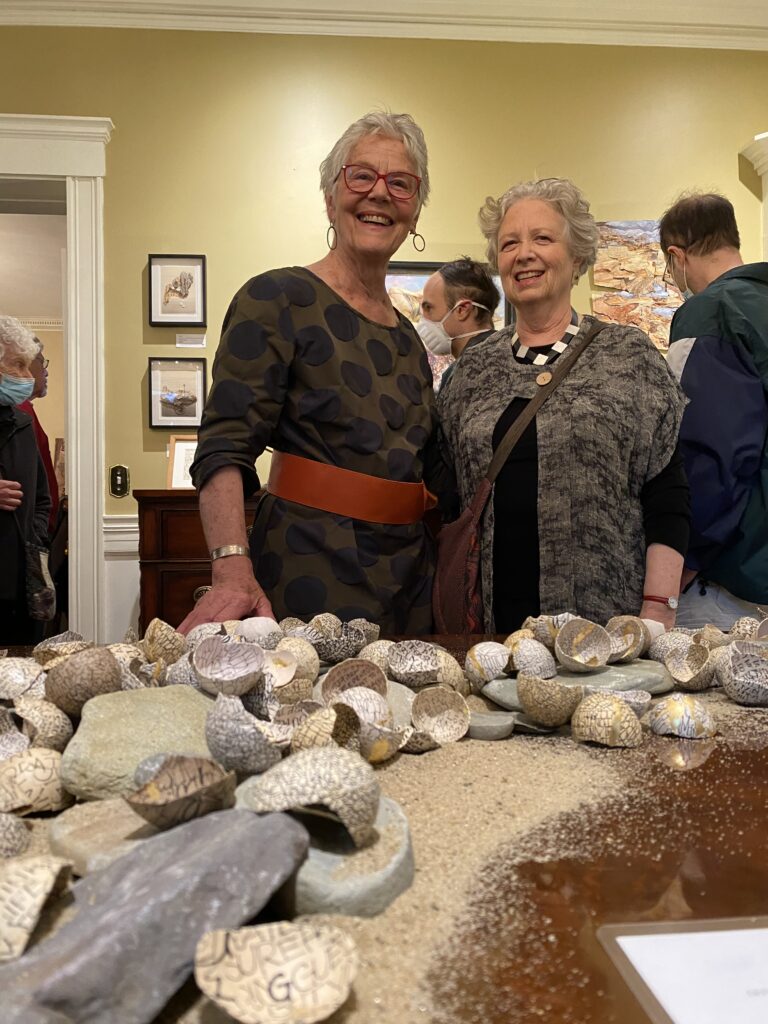
SITTING WITH MY HUSBAND ON A BENCH IN FRONT OF CLAY POND
a not-so-beautiful pond, but I like the way the leaves
form an arch over the water, the sun slanting through,
making them glow, and on the far side of the pond
we see a swan my husband refers to as “a white fish,”
which makes me think more about the solitary swan
we’d passed earlier who was sitting on the bank—
the way she was grooming herself so conscientiously—
this is her work, after all—corkscrewing her limber
and endless neck under her, nipping one feather,
then another, and then I began to listen to some water
sounds on my meditation app as I looked at the moiré
patterns the wind was making on the actual water,
and the wind was just the wind, but cool on the edges
with a slightly warm core from the warm day, and yes,
the earth is probably dying, and on the radio today
I heard the Colorado River is running out of water
and can maybe be saved if people would only eat
one less hamburger each week, which shouldn’t be
a big deal but is, and I don’t eat hamburger anymore
and live nowhere near Colorado as I once did.
And I don’t know how many more walks like this
we will have together, these our most ordinary walks,
and I’m trying to hold this space as something sacred,
even with a dozen or more cigarette butts littering
the ground under my feet and a lasso of fish wire dangling
from a branch, and if the wire gets into the pond it will
likely strangle a great blue heron or some fish, which
are likely already done for (a signpost says, “This water
may have been contaminated with chemicals”)—which
pisses me off—was it or wasn’t it, and who is minding
this water anyway? Water that nevertheless looks serene
and beautiful under the setting sun. We start walking home
when I notice that the swan we’d seen earlier is now
gliding toward the swan on the far side. And I name
the one swan acceptance and the other swan grief.
— Wendy Drexler
“Apology to My Ovaries”
They plucked you out before you could kill me.
I had to make a clean sweep. Forgive me,
conductor of my train to the future—
my artist daughter of long fingers
and kindness, my son with his kilowatt wit
and quiver of dreams. You were my gardener,
my stockpot, my pantry, your shelves
filled with my lifetime supply.
My arbor, predesigned, assigned at birth.
My divine egg timer, my clock that never
needed winding. You were my pinkish-gray,
almond-shaped, and my God, you were brave,
wore menstruation like a brightly flowered dress.
And the bloody labor of your fields.
Your timely hatchery, your drop-down
deliveries, your tubes swaying like anemones.
I, too, thought we could wither together
into gentle senescence. Forgive me
for evicting you in your dotage, not even
a hearing, your desk cleared in an hour,
everything you’d ever carried weighing
just over two ounces. Forgive me,
you who were my wheelhouse, my work
horse, my backfill, my unpaid laborer.
You, who toiled decades deep in the mine of me.
This Fierce Elation
—after the photo “Autumn Abundance” by Yvette Melzer
Look into this window with me:
all these tomatoes ripening
on the sill, their fleshy heft caressed
by light—these Romas in a bowl
are fire-engine red and then a chime
of tangerine, then Brandywine,
then one creamy white that rests
upon the shoulders
of a large-lobed Heirloom,
a peek of tiger—as if their flesh
will never be blemished or blighted,
always this empire of ruby,
amber, sandstone, the promise
of salt on the counter, the knife’s
slice, and seduced as I am
by such fierce elation, I haven’t
noticed until now there’s a woman
behind them, camouflaged
against the sepia background
(her kitchen?), thin-strapped chemise,
bare shoulders, a mug of coffee
in her hand, and now I look harder,
the woman’s fingers are clenching
the handle of the mug, her grip insisting
I see the work of holding on—
planting the seeds in soil, watering,
weeding so the seeds would cling
to earth, staking the sprouting tendrils,
holding each ripe tomato in her
cupped palm, confirming wholeness,
before she picked them one by one,
placed them gently in her basket
and carried them into her kitchen,
setting them down on that sill—
I see you, vigorous parade
of tomatoes, woman with your still-
warm cup of coffee in your hand.
All the Hours the Night Has Left
What I’ll never have is close to, or nearly equals,
what I’ve had. I find myself at equilibrium,
which may last only a day—the mayfly’s
brief happiness—no way of knowing
Burial of a Woman With the Blackened Shells of 86 Tortoises
—Southern Levant, 10,000 BCE
What if 40 shells had been placed in her grave,
one for each of her years? I hope they held
a shelf for sorrow, eased her husband’s grief
for her hair, her sighs, her voice. A ritual spell,
the leg of a boar on her shoulder to widen the way.
Could those pelts have kept her from the cold,
the two stone martens they spread across her body,
and liquefaction of her soul, that stole
that warmed her breasts? I hope she loved, and hard,
that the aurochs’ tail steadied her spine.
and the eagle’s wing was transport, carried her
past the uphill grass to outlast time.
Sprinkled like holy water, those tortoise shells,
with or without the need for heaven, for hell.
*
With or without the need for heaven, for hell,
I clutched my bony rabbit’s foot for luck—
the rabbit dead, the foot chopped off. Cruel,
that crisp, gold-capped clasp. No blood. No muck.
At night in bed I stroked the silky fur,
brown and white, slept with the chain so tight
around my finger it left a faithful ring.
The lore: kill the rabbit in the night,
a graveyard moon, the rabbit set down, crying
like a natural child. And I’m stuck
on why they placed a hacked-off human foot
inside the woman’s grave—was that for luck?
Must we kill, need we sever,
to turn ourselves golden and forever?
To turn ourselves golden and forever,
that’s what we want, but I don’t really know
what my mother wore for her burial,
her lavender Ultrasuede or did someone sew
a shroud? Was she sleeked in the full-length mink
my stepfather gave her? Did she crave a slub
of silk from her father’s vest? Maybe she wanted
her easel, back brace, blue rubber brush to scrub
each apple with soap. Where were the lace-up Oxfords
she needed (her ankles, weak), where was our family
dog, or his leg bone, at least? And what did she say,
last visit in Maine, as she was vanishing
at 56? After brief remission.
I forget what she said (forgive me), I didn’t listen.
*
I forget what you said (forgive me), I didn’t listen
until now, your voice in your letters, fifty years ago,
it’s clear that something sharp had come between us—
barbs, worry, wishes and warnings and scolds.
Closing my eyes, I smell your geraniums, the ones
with leaves like tongues, their ruddy scent. Your knack
for tackling dandelions. You loved your hands
in dirt. To nurture growth meant pinching back
the blooms. All those years you circled my pool—
stay out of the deep end, stay out of the sun.
Too many be-sure-to’s and shouldn’ts. The stains I’d left
on the counter. Unsure of myself and whatever I’d done.
How hard you were trying to love your daughter.
What trouble we had, what turbulent water.
What trouble we had, what turbulence,
you’d speak to me in code, in nuts and bolts—
how long to cook a roast, best to soak
an egg pan in cold water, don’t burn the toast—
when what I needed was metaphor, to link the distant,
a bridge over churning water to carry me past
your house to Saturdays with my weekend father:
the drive-ins and car rides with him rushed by too fast.
Mother, remember we watched the “Sound of Music,”
the motherless children, their bright-eyed, breezy new start.
The fairytale-gloss: they never did cross
the Alps. The truth’s like water, can’t tease it apart.
It was myself I hadn’t found.
A girl can easily run aground.
*
A grasshopper phobia ran you aground
each time you saw one. Once in the car, you swerved
to the curb, undone. Had a schoolboy stuffed one
down your blouse when you were young, unnerved you?
I could have taught you to love them, to see their claws
as supple strength. Your shield, that thistle-green thorax.
Their mandibles as sturdy as your will
to live. Their antennae as your last chance.
The music of hearing them rub the pegs on their legs.
I was your bell, you rang me faint and feeble.
You were my church, you preached and preached and preached.
And you were the steeple. I tried to cling to the people
you thought I needed to know. When I lean down
I hear your silence working its way through the ground.
I hear your silence working its way through the ground
when I remember how I wanted to hurt you—
I’m never going to have children—so sure of myself,
my urge to dismantle my need for you, to refuse
what I knew you wanted. If I stitched you a quilt—
one patch for shame, one for sorrow, one
for when I wasn’t there when you were dying.
One for my denying. I was undone.
I know you loved me hard. The way a mouse
licks and licks her babies, you licked me late
and long. I nearly drowned inside your spell.
Those licks. To keep me at bay or from harm’s way?
I’ve only these 98 lines to soften, to save.
What if I’d placed 56 shells in your grave?
What’s to Be Is Already Written
—My prize-winning ekphrastic poem, “What’s to Be Is Already Written,” inspired by the photo “Fading Memories” by Suzette Dushi, as part of the Griffin Museum of Photography’s exhibit entitled “Once Upon a Time: Photographs that Inspire Tall Tales”
in the sinews, in tibia and fibula, in the small
bracelet of wrist: this boy in a bathing suit
perched on a rock at shoreline. Trace the dark mane
of hair that crests over his studious eyes, trace
the hairless chest down his jaunty hands
resting lightly on his hips, as if he could hold
the whole ocean inside the crooks of his arms.
Turn, turn, and here beside him is the man
he will become, shirtless, seated, facing away
from the camera, his spine raised like a mountain ridge
above two valleys. Each vertebrae has been a long march.
I shall not want.
Slack skin eddies under his armpit.
In his narrow room: bedside table lamp,
bed with rumpled pillow,
Chippendale headboard.
Nursing home? Or spare bedroom like the one
my grandfather lived in for years, behind the kitchen
at my aunt’s house, shuffling in slippers and robe
heating up leftovers in a Pyrex dish, humming
tunelessly to himself. In the photo, this man
has lowered his nearly bald head (side of his face
in shadow), dreaming the boy on the rock, who
has been waiting for him all these years.
Imaginary Interview
—after Jillian Weise
Q: How old was I anyway when you had me smashed to pieces—my cilia, my septum, my nares, my vestibules, my bridge?
A: Just 16.
Q: I filtered the air for you, I smelled cheese pizza and Hershey’s kisses for you, I moistened, I air-conditioned, I cleaned out foreign debris. Why did you hate me?
A: I was young. It was the thing to do. That little bump on top bothered me. Assimilation was tacitly understood. In my defense, do you remember Bobbi Glick, Marcy Leiser, Jodi Weisberg, or my cousin Marian? The popular girls all did it.
Q. But your boyfriend Ron liked me and tried to talk you out of it. I made you look distinctive, he said, not like everyone else.
A: I thought he’d like me even more. I thought everyone would like me more. I thought I’d like myself more.
Q: Why did you skip out of town for this?
A: My mother booked the best doctor in Beverly Hills. Known for his pure profiles, no artificially stretched skin. Nothing pug like a Pekinese, the way some girls turned out.
Q: The last thing I remember was inhaling that sickly-sweet smell. After that I was toast. I heard you were black and blue and bloodshot for days after in that hotel room.
A: Yes, all true. My mother applied cold compress after cold compress. My eyes were Zombies.
Q: Can you say plastic surgery got you what you wanted?
A: In college I could pass. The WASP sororities all wanted me. But then Theta found out I was Jewish and wouldn’t take me. I never knew how they knew. But Kappa Kappa Gamma chose me! Kappa was la plus ultra! All Mainline. Private schools. Gold circle pins. Pappagallos. Eye candy. Can you understand? Candice Bergen was my sorority sister! And the boys . . . everyone in SAE wanted to date me!
Q: Am I supposed to feel happy for you?
A: I dropped out of Kappa after two years. I wasn’t like them after all.
Q: Don’t you feel like you’ve abandoned your tribe? Who you are?
A: My family wanted to be only a little Jewish. So it wouldn’t show. So we wouldn’t stick out.
Q:
A: My mother was blond and had a cute little button nose.
Q: Have you forgiven yourself?
A: I want the rabbit to live, but the hunger of the hawk is always turning inside me.
